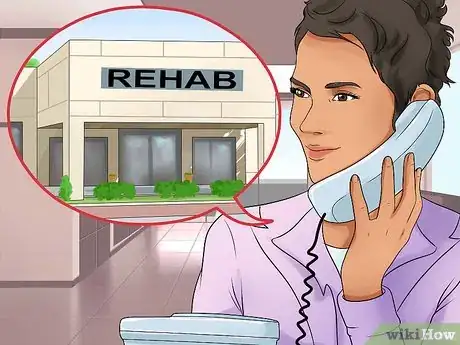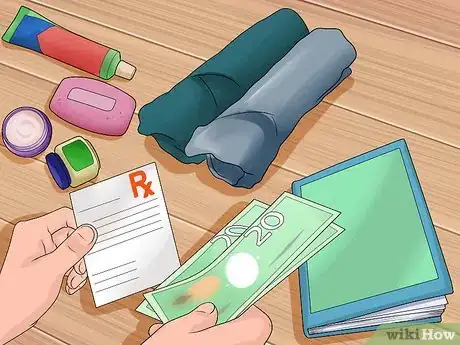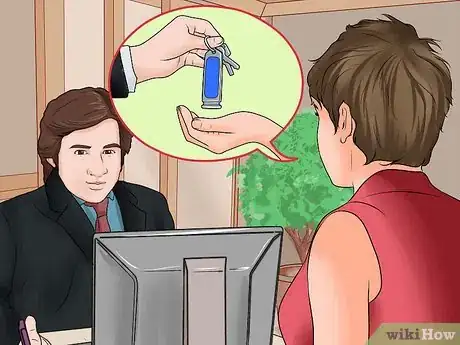This article was co-authored by Trudi Griffin, LPC, MS. Trudi Griffin is a Licensed Professional Counselor in Wisconsin specializing in Addictions and Mental Health. She provides therapy to people who struggle with addictions, mental health, and trauma in community health settings and private practice. She received her MS in Clinical Mental Health Counseling from Marquette University in 2011.
This article has been viewed 64,118 times.
A rehab service may be your key to overcoming a variety of addictions. Whether the issue is a drug addiction or a problem with alcohol, there are many treatment centers qualified to help. There's plenty of information that you may not be aware of when considering treatment and entering a facility. Checking into rehab takes courage, and it is much easier to manage once you have found the right treatment center where you will be able to focus fully on recovery.
Steps
Finding the Right Rehab Center
-
1Determine whether or not rehab is the appropriate action to take. This decision involves focusing both on the severity of the problem, and on the underlying issues that trigger your substance dependence. These underlying issues are what may best be handled with the help of professionals. You may have difficulty with mental or physical health, occupational issues, or social anxiety.[1] The following are outward signs of addiction that might be well addressed by a rehab center.[2]
- High tolerance to your drug of choice, and needing larger and larger doses to achieve the same effect.
- Symptoms of withdrawal that accompany increases in tolerance. If limiting your use causes extreme anxiety, sweating, or nausea, it's likely that you'll need professional assistance to detoxify.
- Turning to your drug of choice despite telling yourself and others that you want to stop. This is the vicious cycle of using only in order to alleviate the symptoms of withdrawal.
- Being unable to keep up your drug habit and put time and energy into other parts of your life. This usually means that you spend much less time with people who do not use with you and are unable to keep up relationships with non-users.
- Having mounting financial, legal, or professional problems. If you have been fired, penalized or become strapped financially by your drug use, rehab is likely a good idea.
-
2Arrange to cover the financial cost of rehab. Survey your options, and find facilities that you will be able to afford or cover with outside assistance. Costs can be high, especially since it is common to go to rehab facilities that require you to travel.[3] Ask all prospective facilities what kind of insurance they take, and check with your insurance provider to see if your policy covers rehab stays.
- Many treatment centers have financial counseling and financing available for qualified patients. So, ask about what sort of payment plan will be available to you.
- Sometimes state funding is available for people in need of rehab. [4] A call to your state's social services office will help you find out if you are eligible for some form of subsidized treatment. Then, locate a center with federally funded or subsidized spaces.
Advertisement -
3Look at specific types of treatments. It's important to choose a center that offer treatment programs will benefit you the most. There is a variety of programs, many of which will use hybrid methods. One facility will usually offer a variety of programs to fit individual needs. Here are a few common formats you may see on your search:
- Detoxification treatment. This is usually offered for people addicted to alcohol, opiates, nicotine, barbiturates, and benzodiazepines. Detox treatment may require the use of other drugs (like Methadone or Naltrexone) or 24/7 medical oversight.[5]
- Long term residential treatment. Long-term rehabs usually run for 6 to 12 months and focus on maintaining sobriety in a communal setting.
- Short-term residential treatment. These programs last 3 to 6 weeks and usually use 12-step methods so that patients can transition smoothly back to into daily life.
-
4Consider different activities and therapies offered. Different rehab facilities will usually offer a mixture of types of therapy along with necessary medical treatment. Depending on the length of your stay, you can expect to experience the following:
- Group therapy sessions. Group therapy is very common and offers a communal, supportive settings to cope with the emotions of recovery.[6]
- On-site medical care. Some centers offer a full staff of nurses and physicians. Check for accreditation of these rehabs, like JCAHO accreditation (Joint Commission on Accreditation of Healthcare Organizations), which meets standards for quality medical care.[7]
- Individual counseling and therapy. Some programs offer individual counseling that usually involves cognitive-behavioral or holistic therapy.
- Educational lectures and life-skills workshops that are also usually done in medium-sized groups.
Preparing for Rehab
-
1Notify friends and family. Once you have made a decision to go to rehab, let your loved ones know that you're leaving. By doing this you'll be able to share your news before people you care about hear it through the grapevine first. It’s up to you to decide to tell them, or simply keep your privacy and explain that you'll be away for a while.
- Alerting others in advance if you'll need help watching your home or keeping up with your finances. Asking for help is a great way to keep people you care about involved in your big change, as they won't necessarily be present throughout your rehabilitation.
-
2Tie up any loose ends at home. Get everything ready for your absence by making sure that your finances and bills will be kept up to date. This includes utilities, rent, and loans. If necessary, alert your landlord or neighbors that you will be away for an extended time.
- Also, find trustworthy care or boarding for any pets and plants that you have.
-
3Communicate your intent to a rehab center. When you have made a decision on the facility you want to go to, contact the center and make arrangements for getting your treatment underway. Remember to discuss the date of arrival, rules about what you may or may not bring with you, and any remaining questions you might have about the duration of your stay, finances, and visitation once you’re there.
- Find out if you can have visitors and how often the center permits its residents to contact their loved ones. Some centers will prefer that you do not contact people in your life during part or all of your initial stay so that you can be totally focused on the rehab program.
-
4Accept the situation. Look within yourself and honestly ask why it is that you're going to rehab. Make sure that you don't waste your time and money by checking into a rehab program without being fully committed to recovery and ongoing sobriety. Outline on paper or mentally rehearse your goals for yourself. What do you hope to gain from treatment? Is there anything that you are not willing to do for your recovery?
- Don't get too worried if you feel very anxious and overwhelmed. These feelings are to be expected.
- Try to acknowledge the anxiety that you feel, sit with it for a while, and then continue to move forward, knowing that it's there and that there's nothing wrong with that.
-
5Invite change. Be prepared to open up to a different side of yourself, spiritually and emotionally, that you may not be very familiar with. Rehabilitation requires that you put your heart into it and deeply desire the change it will bring, even if it means relinquishing your old ways of dealing with life.
- Expect that there will be stretches of time at the center when you will feel depressed or alone, and keep in mind that faith in your own healing will lend you the positivity to overcome these feelings.
- Remember to keep your expectations in check. While you've made a great decision to overhaul your life and kick your addiction, the rehabilitation process is long and can often be quite daunting.
Checking Into Rehab
-
1Leave forbidden items at home. Although all rehab centers vary somewhat regarding things you can and can’t bring with you, there are many common items that are not allowed. The following should be left behind unless you are explicitly told otherwise by a staff member at your chosen rehab center:
- Alcohol and drugs (even mouthwash that contains alcohol)
- Pornography
- Weapons (including razor blades)
- Musical instruments
- Outside food, drink, herbal products, and vitamins
- Excessive makeup, jewelry, and offensive or revealing clothing
- Organic substances of any kind
-
2Bring the essentials. Most rehab centers will allow you to bring the following. Again, rehab centers have slightly different rules and expectations, so always call the center beforehand if you are packing and stumble upon an item you’re not sure is allowed.
- Prescription medication to be kept with the staff
- Photos, books, and other personal mementos
- Casual clothing, laundry supplies, and hygiene items (including electric razors)
- Some cash
-
3Check in. Arrive on the specified date and time, and be prepared. Understand that you’ll feel anxiety and maybe some resistance to things that you'll be asked to do--even being told that there are things you should and shouldn't bring can trigger bitter feelings. However, these are normal feelings. Just getting to the center and staying for the duration of the treatment should be your first recovery goal.
-
4Ask the intake specialist any remaining questions. If you have not already addressed certain details about what to expect, the person doing your intake will be able to offer more information. There are different rules for each facility and some may have stricter policies than others may. Consider the following questions:
- Does the program offer ways to minimize cravings?
- Is there a nutritional component to treatment?
- What sort of life skills education will be provided?
-
5Answer all questions honestly. Being as honest as possible about your addiction and your life circumstances will ensure that you are given the most personally beneficial forms of treatment. You can expect to be asked the following questions:
- Why are you choosing to seek treatment now?
- How recently have you used?
- When did you first start using?
- How has using impacted your life?
- What is your medical or mental history?
- What is your employment and living situation like?
- Have you ever been to a rehab facility before?
-
6Prepare for a medical examination.[8] After you speak with your intake specialist, you can expect to complete the admission with a full physical exam and medical history report. This is even more likely if you are in a detoxification program where treatment immediately requires the taxing physical feat of withdrawing from your drug of choice.
Expert Q&A
-
QuestionDoes Medicare cover rehab?
 Tiffany Douglass, MATiffany Douglass is the Founder of Wellness Retreat Recovery Center, a JCAHO (Joint Commission on Accreditation of Healthcare Organizations) accredited drug and alcohol treatment program based in San Jose, California. She is also the Executive Director for Midland Tennessee at JourneyPure. She has over ten years of experience in substance abuse treatment and was appointed a Global Goodwill Ambassador in 2019 for her efforts in residential addiction treatment. Tiffany earned a BA in Psychology from Emory University in 2004 and an MA in Psychology with an emphasis on Organization Behavior and Program Evaluation from Claremont Graduate University in 2006.
Tiffany Douglass, MATiffany Douglass is the Founder of Wellness Retreat Recovery Center, a JCAHO (Joint Commission on Accreditation of Healthcare Organizations) accredited drug and alcohol treatment program based in San Jose, California. She is also the Executive Director for Midland Tennessee at JourneyPure. She has over ten years of experience in substance abuse treatment and was appointed a Global Goodwill Ambassador in 2019 for her efforts in residential addiction treatment. Tiffany earned a BA in Psychology from Emory University in 2004 and an MA in Psychology with an emphasis on Organization Behavior and Program Evaluation from Claremont Graduate University in 2006.
Founder, Wellness Retreat Recovery Center If you need help finding affordable substance abuse treatment, contact your county's department of drug and alcohol services and ask about county-funded treatment options. You might also find options through churches or private nonprofits like the Salvation Army. Just keep in mind that these programs do sometimes have long waiting lists, and there may be requirements in order to stay on the list, like calling once a week to check in.
If you need help finding affordable substance abuse treatment, contact your county's department of drug and alcohol services and ask about county-funded treatment options. You might also find options through churches or private nonprofits like the Salvation Army. Just keep in mind that these programs do sometimes have long waiting lists, and there may be requirements in order to stay on the list, like calling once a week to check in.
References
- ↑ http://www.rehab-programs.org/whitepapers/choosing/
- ↑ https://www.mayoclinic.org/diseases-conditions/drug-addiction/symptoms-causes/syc-20365112
- ↑ http://www.drug-rehabs.com/
- ↑ http://www.choosehelp.com/topics/drug-rehab/the-costs-of-drug-rehab
- ↑ http://www.rehab-programs.org/whitepapers/choosing/
- ↑ http://www.rehab-programs.org/whitepapers/choosing/
- ↑ http://www.drug-rehabs.com/
- ↑ http://www.pavillon.org/frequently-asked-questions.php










































































